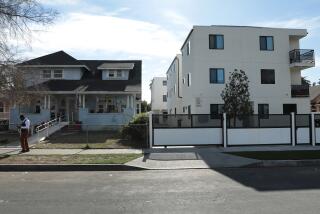Editorial: L.A. City Council members shouldn’t have the power to veto homeless housing projects at a whim
Developers scale considerable hurdles to build housing for homeless people in the city of Los Angeles. They must cobble together financing from the city and myriad other sources, woo the community, and line up the special services needed by the new residents. They should not have to surmount the additional hurdle of getting a City Council member’s stamp of approval at the beginning of the development process.
That, however, is what’s required, in the form of a letter of acknowledgment from the council member in the district where the proposed project sits. Before the project can even be considered for the Proposition HHH funds that voters approved to build thousands of units of badly needed housing, the developer must get a letter from the council member essentially pledging support for it.
So, a council member’s refusal to supply the letter for a project needing HHH funds amounts to a de facto veto — done for any reason and, largely, out of the public eye. Without the letter, the project is rejected at the outset by the city’s Housing and Community Investment Department, which evaluates all applications for funding before making its recommendations.
A council member should not be able to scuttle a project up front for whatever reasons the member chooses.
Granted, the letter is not exactly a novel requirement. For the last decade, developers applying for whatever city money that was available for homeless or low-income housing have had to get a letter from a council member first. After the passage of HHH, which authorized $1.2 billion in bonds over 10 years for homeless and low-income housing, the council applied the same requirement to those projects.
But that doesn’t make the practice sensible or right, especially when we desperately need this housing.
Councilman Curren D. Price, whose district includes much of South L.A. has refused to provide a letter to LINC Housing Corp., an experienced developer of affordable housing, for a project that would turn a blighted corner on Florence Avenue into a development for homeless individuals. After his staff met with the developer several times, Price said, he concluded that the design was inferior. He also wanted it to house homeless families, not just homeless individuals.
The developer offered adjustments to the project, but Price and his staff decided they were still not acceptable.
A council member should be able to weigh in on a project in his or her district. Under the best circumstances, the member can offer useful advice and help win support for the project from the community. And a developer would be foolish not to consult with a council member throughout the process.
But that’s just it — this is a process. Developers of supportive housing routinely revise designs as they meet with the affected community. They also meet early and often with the council member’s office. And they must run a gantlet of reviews before they ever see a dollar of HHH money — the housing department, the HHH Citizens Oversight Committee, the HHH Administrative Oversight Committee, the council’s Homelessness and Poverty Committee, and the council itself all weigh in. So council members always have a decisive say at the end of the process — in public and on the record.
A council member should not be able to scuttle a project up front for whatever reasons the member chooses. That amounts to an exercise of unlimited discretion. If members are concerned about the design or other characteristics of these projects, they should set clear, specific standards that would apply citywide.
Price notes that he has given letters of acknowledgment to several other homeless housing projects in his district that have applied for HHH funding. And both Price and the developer say they are open to revisiting this particular project and starting this process over again — but it shouldn’t have to start over again.
And what about the developers with projects who can’t even get a council member to respond to a request for a letter? At least one respected developer contends that has been an issue.
The residents of Los Angeles have taxed themselves to give the city government the funds to build 10,000 units of housing to stem the homelessness crisis. And we want that housing built well. But that doesn’t require giving each council member a preemptive veto.
Follow the Opinion section on Twitter @latimesopinion or Facebook
More to Read
A cure for the common opinion
Get thought-provoking perspectives with our weekly newsletter.
You may occasionally receive promotional content from the Los Angeles Times.






